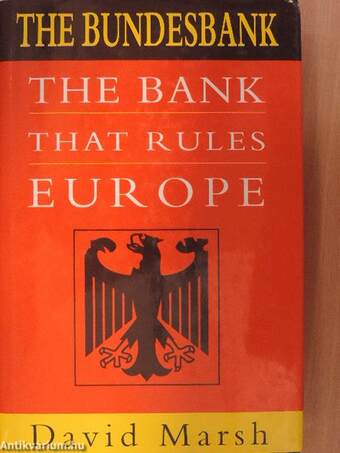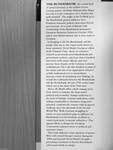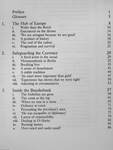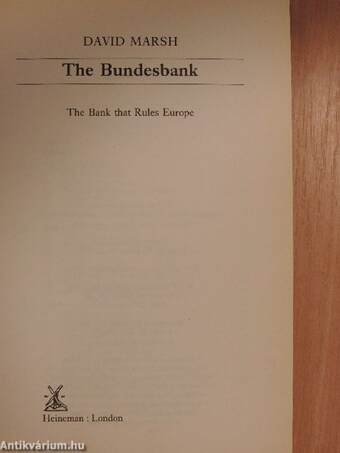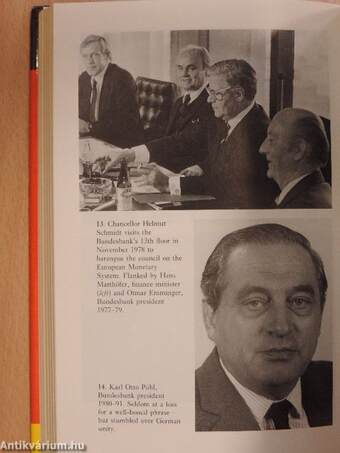1.067.297
kiadvánnyal nyújtjuk Magyarország legnagyobb antikvár könyv-kínálatát

VISSZA
A TETEJÉRE
JAVASLATOKÉszre-
vételek
The Bundesbank
The Bank that Rules Europe
| Kiadó: | William Heinemann Ltd. |
|---|---|
| Kiadás helye: | London |
| Kiadás éve: | |
| Kötés típusa: | Fűzött kemény papírkötés |
| Oldalszám: | 359 oldal |
| Sorozatcím: | |
| Kötetszám: | |
| Nyelv: | Angol |
| Méret: | 24 cm x 16 cm |
| ISBN: | 0-434-45116-9 |
| Megjegyzés: | Fekete-fehér fotókkal. |
naponta értesítjük a beérkező friss
kiadványokról
naponta értesítjük a beérkező friss
kiadványokról
Fülszöveg
THE BUNDESBANK, the central bank
of united Germany, is the symbol of new
German power. As Prime Minister John Major
has said, it is the centrepiece of'a modern-day
gold standard'. The might of the D-Mark gives
the Bundesbank greater influence over
European monetary policies than most elected
governments. As a result of Britain's full
membership of the Bundesbank-dominated
European Monetary System in October 1990,
policy over British interest rates is now made in
Germany.
In bringing to life the Bundesbank and the
people who run it, this expert study leaves no
stone unturned. David Marsh, European editor
of the Financial Times, draws on extensive
research in previously secret Bundesbank and
government archives, and more than a hundred
interviews with senior officials, past and
present, from all parts of the German economic
establishment. His is the first detailed account of
the nature and role of an organisation which is
as little understood as it is... Tovább
Fülszöveg
THE BUNDESBANK, the central bank
of united Germany, is the symbol of new
German power. As Prime Minister John Major
has said, it is the centrepiece of'a modern-day
gold standard'. The might of the D-Mark gives
the Bundesbank greater influence over
European monetary policies than most elected
governments. As a result of Britain's full
membership of the Bundesbank-dominated
European Monetary System in October 1990,
policy over British interest rates is now made in
Germany.
In bringing to life the Bundesbank and the
people who run it, this expert study leaves no
stone unturned. David Marsh, European editor
of the Financial Times, draws on extensive
research in previously secret Bundesbank and
government archives, and more than a hundred
interviews with senior officials, past and
present, from all parts of the German economic
establishment. His is the first detailed account of
the nature and role of an organisation which is
as little understood as it is extraordinary.
Among a series of astonishing new findings, he
reveals the continuity between the Bundesbank
and the Reichsbank, the pre-1945 central bank
which was at the heart of the Nazi state.
Above all, Marsh offers a fresh vantage point
from which to examine the deep-seated
political and economic changes underway in
the heart of Europe. German unification, while
adding considerably to Germany's long-term
potential, confronts the country with its gravest
challenge since the aftermath of the Second
World War. With Germany struggling to
master an unaccustomed surge in inflation, the
Bundesbank is in the forefront of efforts to
control post-unity economic turbulence. This
appears likely to disrupt the European
Community's planned move to political and
monetary union.
This book addresses a basic question of power:
Who will control Europe's money during the
1990s and beyond? David Marsh's thought-
provoking conclusion is that the Bundesbank
will remain firmly in charge. Vissza
Témakörök
- Közgazdaságtan > Gazdaságpolitika
- Közgazdaságtan > Pénzügy > Bank
- Közgazdaságtan > Gazdaságtörténet > Tanulmányok
- Idegennyelv > Idegennyelvű könyvek > Angol > Közgazdaságtan > Gazdaságpolitika
- Idegennyelv > Idegennyelvű könyvek > Angol > Közgazdaságtan > Pénzügy > Bank
- Idegennyelv > Idegennyelvű könyvek > Angol > Közgazdaságtan > Gazdaságtörténet > Tanulmányok
- Közgazdaságtan > Közgazdasági elméletek > Európai Unió
- Idegennyelv > Idegennyelvű könyvek > Angol > Közgazdaságtan > Közgazdasági elméletek > Európai Unió
David Marsh
David Marsh műveinek az Antikvarium.hu-n kapható vagy előjegyezhető listáját itt tekintheti meg: David Marsh könyvek, művekMegvásárolható példányok
Nincs megvásárolható példány
A könyv összes megrendelhető példánya elfogyott. Ha kívánja, előjegyezheti a könyvet, és amint a könyv egy újabb példánya elérhető lesz, értesítjük.



